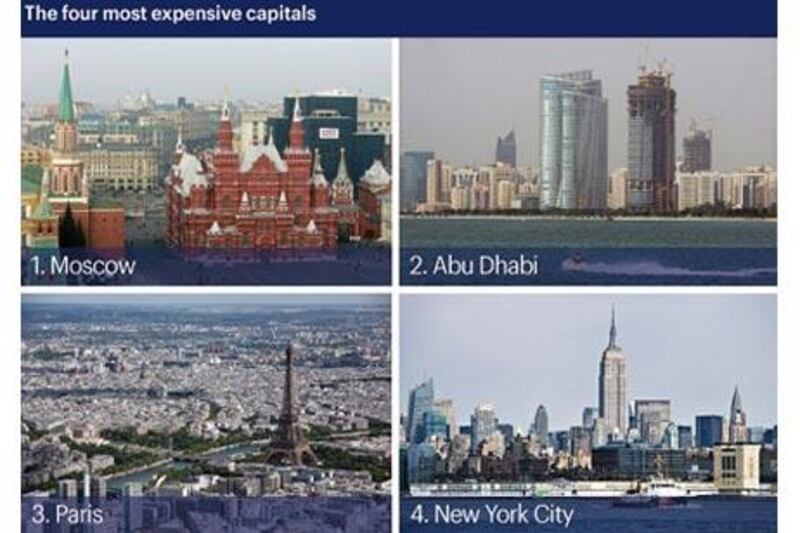ABU DHABI // The capital's new-found status as the world's second most expensive business destination is causing headaches for firms keen to carve out a niche for the city as a top conference venue, event organisers said yesterday.
Abu Dhabi is second only to Moscow in the average cost of hotel accommodation, according to a report by the Hogg Robinson Group, an international business travel firm. And while the remainder of the world's most costly business tourism destinations saw double-digit price slumps during the first half of the year, room rates in Abu Dhabi rose by five per cent. Business travellers visiting the capital can expect to pay an average of Dh1,390.22 (US$378.50) per room per night.
In Dubai during the same period, hotel rates tumbled by almost a quarter, to Dh1,003.23, as the global economic slowdown cut demand for rooms. In Abu Dhabi, conference management companies complained that the high room rates were making the city uncompetitive. The upward pressure on prices would ease only as new hotels opened, they said. "Although we work with a UK-based travel agent who [makes] our Middle East hotel bookings and secures good rates for us, expensive hotel rates are still a concern for us," said the general manager of Nexus Holdings and Associates, Neil Manwaring, whose firm is staging the Middle East Broadcast Solutions (MEBS) 2009 conference in the capital.
"Hotel rates are not competitive, and when larger exhibitions are held, they tend to increase until a cap is put into place." However, despite the lower hotel prices in Dubai, Mr Manwaring ruled out a shift away from Abu Dhabi by his company. "We will continue organising our events here in Abu Dhabi, because we feel it is the new hub and the biggest platform in the Middle East, but, obviously, the rates of hotel rooms here are a challenge for us.
"The solution is more hotel rooms, which will bring the prices down and force competitiveness," he added. "There is a lack of hotel rooms now compared to Dubai, but that will quickly change." The Abu Dhabi Tourism Authority (ADTA) said the city currently had 13,000 hotel rooms, with a further 3,000 expected to open by the end of the year; 4,000 more are expected to become available next year. The authority conceded that hotel prices were rising and attributed the trend to strong demand.
"Abu Dhabi is a place where business is still actively being done," it said in a statement. Akram Sabri, the general manager of Sky Conferences and Exhibitions, which is organising the Bonjour La France European Exhibition for later this year, spoke about the effect of higher hotel rates. "We have a lot of people coming from France who have asked us for two or three-star hotels, thinking that the prices we gave them are so high because they are five-star hotels," Mr Sabri said.
"They don't care about where they are staying, as long as it is affordable, but we can't offer them anything affordable. "The exhibition and conference industry is important to Abu Dhabi. "We are beginning to rent out our stands for less so we can entice exhibitors who will also have to consider hotel costs and flight costs. "We know what the situation of hotels is like here in the city, so we try to find other ways to keep our clients."
The high room prices should be seen in terms of market dynamics, said Reema Baroudi, a spokeswoman for the InterContinental, one of the city's biggest hotels. "By the end of October, there will be a number of new hotels opening and much more supply available. "Normally, an increase in hotel supply would drive down prices, but there are so many projects being launched in Abu Dhabi, I would expect the number of business travellers to continue to increase.
"Whether or not the increased number of rooms will be enough to satisfy the increase in demand is difficult to know." Hotel chains including Fairmont, Radisson, Holiday Inn, Crowne Plaza are expected to open properties later this year. The new, 499-room Yas Hotel will open this year at the heart of Abu Dhabi's Grand Prix racetrack in time for the finale of the Formula One season in November. Business travellers made up around 90 per cent of hotel guests, an increase from the 80 per cent in 2008, Ms Baroudi said.
"Abu Dhabi is a booming business centre. There are a lot of things happening in the city which continue to draw people here for work." Klaus Niefer, the deputy general manager of Le Meridien, said that the higher room rates reflected the fact that Abu Dhabi had been more sheltered from the worst effects of the global credit crunch. "The people who are coming to Abu Dhabi are still mostly business people, and the supply of rooms is still quite moderate.
"The US and Europe has been worst affected [by the economic slowdown], and they felt the impact sooner, too. "England is still a key feeder market for Dubai, particularly in the financial sector, so any impact felt in England as a consequence of the slowdown will be felt in Dubai." Abu Dhabi's hotel market remains relatively small and undersupplied, according to Max Cooper, executive vice president of Jones Lang LaSalle Hotels, the commercial real estate brokerage firm.
"The current stock of hotels is also heavily skewed to the upper tier segments, with approximately 58 per cent of hotel rooms being five-star and 32 per cent four-star," he said. "With a significant increase of hotel inventory coming on line by year end and over the next two years, it is expected there will be additional pressure on rates generally in this market as has been experienced in Dubai."
chamilton@thenational.ae hkhalaf@thenational.ae * With additional reporting by Rebecca Bundhun






